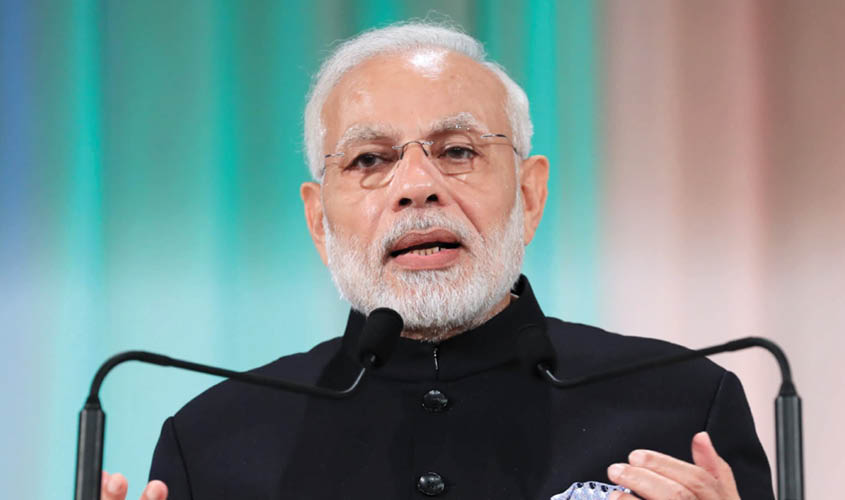PM intends presenting before the comity of nations India’s role on the global platform, which includes inter alia sustainable development and war on terror.
Narendra Modi is all set to create great precedents in his tour of America, which he embarks on in the coming days. To begin with, Houston’s “Howdy Modi” event, in which President Donald Trump joins him, will be a newfangled moment in international affairs. He follows this up later next week by receiving in New York the Goalkeepers award from Bill and Melinda Gates Foundation in recognition of the Swachh Bharat Abhiyan, an initiative he triggered in his Independence Day speech in 2014. Goalkeepers Global Goals Award is a prestigious recognition for work in sustainable development.
On the eve of the Prime Minister’s departure, Foreign Secretary Vijay Gokhale categorically stated that India would not discuss issues relating to recent internal developments relating to Jammu & Kashmir at the United Nations. Narendra Modi intends presenting before the comity of nations India’s role on the global platform, which includes inter alia sustainable development on the one hand and the war on terror on the other. His decision to wink at J&K developments, which India rightfully considers an internal matter, will rob Pakistan’s Premier Imran Khan an opportunity to lock horns on an issue, which has been a constant in Pakistani campaign in the UN over the decades.
Post Shimla Agreement Kashmir was treated as a bilateral issue. Recent attempts by Pakistan to internationalise the matter has been trounced by effective use of diplomacy by India. Pakistan could not muster the support of the requisite minimum number of 24 votes to be able to flag its viewpoint before the Geneva based United Nations Human Rights Commission (UNHRC). The strong reiteration of India’s stand by Secretary (West) in the Ministry of External Affairs, Mrs Vijay Thakur, combined with the stewardship of the foreign office by Vijay Gokhale. Foreign Secretary and the leadership provided by technocrat External Affairs Minister S. Jaishankar and the proactive negotiations by National Security Advisor Ajit Doval have ensured “vijay” of Indian diplomacy.
An ironical coincidence is that like in 1971, in 2019 as well, Pakistan is perhaps jinxed by the leadership of a Niazi. Premier Imran Khan’s full name is Imran Ahmed Khan Niazi; the Pakistani commander who surrendered with his 90,000 troops to India in Dacca (now Dhaka) in December 1971 was Lt Gen A.A.K. Niazi. In a recent analysis of Imran Khan’s 13 September visit to Muzaffarabad (Pakistan occupied J&K) security analyst Avinash Mohnaney reported that slogans of “Niazi, go back” were raised by the crowd. Apparently, the citizens of POJK were taking a pot-shot at the historical irony of the name Niazi, while Imran Khan was urging Muslims worldwide to unite with Pakistan’s stand.
Prior to his departure for the UN session, Narendra Modi made an impassioned appeal during his speech at Nashik that the country needs to embrace every Kashmiri and India needs to make the valley a paradise again. Simultaneously, in Srinagar, J&K Governor Satya Pal Malik said that POJK need not be taken back by war, but by making the development model of J&K robust so that the populace under Pakistani occupation is enthused to demand return of their homeland to India. Referring to the enthusiastic comments by some on the Ayodhya issue, in his Nashik speech Narendra Modi criticised “bayan bahadurs” (motormouths) and “badboley” (loudmouths). It is noteworthy that Governor Malik’s remarks in Srinagar were made in the backdrop of statements by several top functionaries of the Union government and the ruling party who had spoken about India regaining physical jurisdiction over POJK “one day”. (The anti-Imran slogans raised in Muzaffarabad on 13 September perhaps prompted Governor Malik to spell out his agenda.)
Union Home Minister Amit Shah, the architect of the present phase of Indian policy on J&K, has visited the state more than once. Unlike his predecessors he was not greeted by a bandh in the valley. In his last visit he met the representatives of the elected panchayats and urban local bodies and empowered them with liberal development funds which they sought. The abrogation of Article 370 having extended Rajiv Gandhi initiated 73rd and 74th Amendments to the Constitution of India, which empower local self-government institutions, to J&K the visit of Union Home Minister and the subsequent enthusiasm witnessed among the local bodies in J&K, hold promise.
This is not to say that all is hunky-dory in this troubled part of the country. Preventive detention and curbs have been a negative since 5 August. But J&K in its chequered history, especially since the rise of Pakistan sponsored militancy in 1989, has seen worse days in the past three decades.
There is need for caution. The events in Afghanistan have cast their shadow over J&K ever since Taliban was created by western powers to oust erstwhile USSR from the region. Pakistan’s Inter Services Intelligence (ISI) diverted part of the cloak and dagger funding to J&K and the residue of Afghanistan problem spilt over to India. With US planning withdrawal from Afghanistan and Taliban playing hide and seek with the Trump regime, India’s development agenda in J&K may be jeopardised collaterally.
The current visit of Narendra Modi to the US and his interactions at the UN assume added significance in this backdrop.

